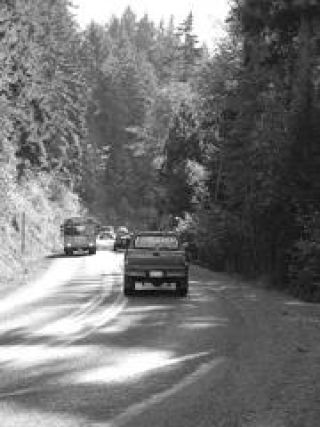By Dennis Box, The Courier-Herald
Look into the future and imagine what Bonney Lake might look like in 2030. How many people will have moved into the South Plateau? How many cars will be heading to work at 6 a.m. after the Cascadia and Falling Waters developments are built, adding nearly 8,000 new homes?
This is a hint of the future and the types of questions that prompted the Pierce County Council in 2001 to direct county engineers to begin the Rhodes Lake Road Corridor Study in search of a new road off the South Plateau connecting to state Route 162.
The study is a two-year, three-phase project that began in February and will end sometime in early 2006. It will culminate with a vote by the Pierce County Council on the study's recommendation on building another roadway. Project coordinators are completing phase two, evaluating route alternatives, and the most recent action came on Oct. 22 when Pierce County held an open house meeting for public comment on its findings.
In phase two, county engineers have narrowed the route choices from 20 to four east-west routes that will connect the Bonney Lake's South Plateau to state Route 162, which connects Orting with Sumner. A fifth option is to not build another road.
"We are trying to develop a network to serve a population growing from 3,500 to 15,000 or more," Project Manager Michael Mariano said. "The current land use and zoning will allow the area to grow like that. Rhodes Lake Road is just one piece of the transportation process. But this is not a done deal. The county council has the final decision."
After analyzing traffic patterns currently moving on Rhodes Lake Road, classified as a secondary arterial, and looking into the future developments, Mariano stated there is a need for six lanes along the corridor.
"It could be a combination of county roads and roads built by Cascadia and Falling Waters," Mariano said. "There has to be a system of highways that will collectively serve the area. We're trying to find a way to accomplish a secondary arterial off the hill."
The no-build option means the county would still address the problem, but in a much more limited nature. "With the no build option we have to look at what 2030 is going to look like if we do nothing," Mariano said.
Of the other four alternatives, two call for extending and expanding Rhodes Lake Road; two others call for expanding proposed roads from Cascadia and Falling Waters. All options begin at 198th Street and extend to state Route 162 with two options involving building a new bridge over the Puyallup River.
State Rep. Jan Shabro (R-31st District) was a member of the Pierce County Council who voted to initiate the study. "When I was on the council we voted for the project study. Something will have to happen whether it's that road or some other substantial plan," she said. "The Rhodes Lake Road Study and the Cross Base Highway are part of the larger county transportation picture. It may be in 25 years our needs will be an east-west connection to I-5. (state Route) 512 is getting crowded," she said.
The study is not without opposition. The Puyallup Valley Preservation Group, organized in February, is concerned that a new road dropping traffic onto SR 162 will ruin their Puyallup Valley neighborhood. The group feels that other alternatives still need to be considered that would further protect the valley.
Mariano said the study's objective is to look at what problems and issues concerning transportation are at the present and what they will look like in the years ahead. "After you strip away all the travel demands we have two lanes and we need four more in the future," he said. "The comprehensive planning process will look at what the world should look like. That is a different process that people also need to be involved in."
The next step for the county is to further analyze and narrow down the alternatives and to prepare a draft of environmental documents. More open house meetings will be held in 2004.
"We feel we have come out of the open house meetings with a lot of good feedback," Mariano said. "This is the most open process I've ever been involved in. Everything is on the table. We have nothing to hide."
The Pierce County Web site (www.co.pierce.wa.us) has newsletters and information on the study.
Dennis Box can be reached at dbox@courierherald.com


